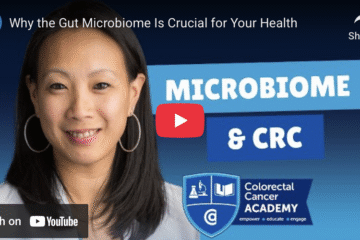What is a Good Gut Health Diet?
Fast Facts
- A healthy diet and a healthy gut are more closely linked to lower colon cancer rates and better survival than any other type of cancer.
- A diet low in fiber but high in processed foods, refined sugar, and red meat can lead to an unhealthy gut and higher risk of colorectal cancer.
- Getting enough fiber and nutrients by eating minimally processed or whole foods can help keep your microbiome healthy and lower your chances of developing colorectal cancer.
Some of our past articles have discussed what to eat over the holidays, how a healthy gut microbiome impacts colon cancer and the importance of fiber (especially soluble fiber). Did you know that colon cancer is more closely linked to what you eat than any other type of cancer? Good gut health has the potential to reduce your risk of getting colon cancer and can improve your survival if you’re unfortunate enough to be diagnosed with this dreaded disease. So, what is a good gut health diet? Let’s take a look!
What is a healthy gut?
A healthy gut is made up of thousands of helpful bacteria, viruses, fungi, and gut lining cells (colonocytes). All of these together make up the microbiome. In a healthy gut, the good microorganisms outnumber the bad ones. There are more cells living inside your gut than in the rest of your body! A healthy gut microbiome helps with all aspects of health, including:
- Digestion and absorbing nutrition
- Immune system function
- Fighting off harmful bacteria in the gut
- Lowering inflammation throughout the body
- Overall brain health (many neurotransmitters are made in the gut)
- Reducing the risk of some types of cancer
What do I eat on a gut health diet?
Some types of food have been shown to increase the diversity of helpful microorganisms in the gut. Eating more of these foods actually feeds the bacteria and fungi in your microbiome. Here are some of the foods that help make a healthy gut:
- Fiber-rich foods: You should aim for about 25-35 grams of fiber a day. Some examples of fiber-rich foods include whole grain cereals, popcorn, whole fruits and vegetables, nuts and seeds, beans and legumes. If you can’t reach your fiber goals with whole foods, consider adding a supplement. One type of fiber (called resistant starch, starchy fiber, or prebiotic fiber) can’t be digested by humans. It passes through the gut and feeds the healthy bacteria in your gut. Prebiotic fiber is a powerhouse fuel for a healthy gut.
- Leafy greens and brightly colored vegetables and fruits: Not only do leafy greens and vegetables have lots of fiber, they also offer phytonutrients like anti-oxidants, polyphenols, anthocyanins, lycopenes, carotenoids and other beneficial compounds. They help prevent cancer, reduce inflammation and are anti-aging.
- Dairy: Enjoying dairy products like yogurt, ghee or butter, milk and cheese can reduce colon cancer risk by up to 20%. Doctors believe that calcium from dairy is the main reason for this observation, but probiotics are also thought to play a role.
- Healthy fats/oils: Focus on eating healthy fats like omega-3s (salmon), extra virgin olive oil, avocados, and nuts. Healthy fats are anti-inflammatory and help with a healthy cholesterol level.
- Nuts and seeds: Nuts and seeds have so many health benefits. They contain trace nutrients, fiber, healthy fats and protein. They can be enjoyed as a snack or added to a salad. They’re easy to carry with you, too.
- Whole grains: Whole grain foods contain all parts of the grain, including the bran, germ and endosperm. Enriched or processed grain foods remove the bran and germ and then add nutrients back. Even when food producers try to add nutrients back into grain foods, they can’t get the same nutritional value and health benefits that are present in whole grains. If you’re avoiding gluten, there are many whole grain options available besides wheat, barley and rye. Consider whole corn, oats, buckwheat or amaranth as alternatives.
- Water: The best way to hydrate is also the simplest- water. Add some sugar-free electrolytes or lemon, lime or cucumbers for a little variety.
The closer foods are to being “whole,” the healthier they are. Processing food removes nutritional value and frequently adds unhealthy sugars, fats, preservatives and other chemicals. Whole foods are always the first choice, as supplements don’t seem to provide the same cancer-fighting benefits.
For a handy-dandy gut health cheat sheet that you can print out, click here!
Are there foods I should avoid for gut health?
While some foods super-charge your microbiome, there are other foods that can damage your gut health. These are some of the foods/drinks you should limit or avoid to help keep your gut as healthy as it can be:
- Processed foods: As we talked about in the last section, processing foods removes many of the healthy nutrients naturally found in them. What’s even worse is that food manufacturers then add unhealthy (but tasty) things like sugar, fat and preservatives to make the food more palatable. These additives can wreak havoc on the bacteria in your gut, and can even cause inflammation and damage the lining of your intestines.
- Red meat and processed meat products: These foods may be high in calories and fat and processed meat can have a lot of artificial ingredients. Opt for leaner cuts of red meat, or choose poultry or fish, instead.
- Refined sugar: Foods high in simple carbohydrates and refined sugars have been shown to be associated with a higher risk of colon cancer. This relationship is especially strong for people who don’t exercise or are overweight. Refined sugar promotes inflammation, raises insulin levels, and is thought to directly feed cancer cells. Foods that contain high amounts of sugar, like sodas and sweet treats, have very little nutritional value.
- Alcohol: Drinking alcohol has many negative effects on health. It damages the liver and lining of the colon, impairs the microbiome and raises the risk of developing colorectal cancer by 20-47%, depending on how much you drink. The current recommendation is that you should only drink on special occasions for optimal health. If you do drink, limit it to 1 drink/day for women and 2 drinks/day for men.
Are there other things I can do for my gut health?
In addition to eating a healthy diet there are a few other “life-style” changes you can make to optimize your gut health. Some small steps you can take include:
- Get enough sleep. Getting 7-9 hours of sleep each night will not only help you feel more rested, it will also help with stress hormone levels and help with weight (both impact colon cancer risk).
- Stop smoking. Smoking contributes to virtually every type of human cancer.
- Get moving. Exercise can promote a healthy microbiome. Walking around your neighborhood is a great way to start.
- Lose weight. Diet-driven weight loss reduces inflammation and turns off cancer-promoting metabolic pathways.
- Manage stress. Chronic stress is associated with an unhealthy gut microbiome, increased inflammation and colon cancer progression. Stress management techniques like mindfulness, yoga, breathing exercises, and meditation may be helpful.
The Bottom Line
What you eat is an important step toward achieving a healthy gut. By getting the right vitamins, fiber, and macronutrients, you can build a gut microbiome that has the best chance of fighting off colon cancer. Unhealthy, processed foods and alcohol can sabotage your hard work. Lifestyle changes like losing a few pounds, exercising and getting enough sleep will boost your efforts even more. Even if you do everything right, you still need to be screened for colon cancer beginning at age 45. Get checked for your loved ones. CheckIt4Andretti.



0 Comments